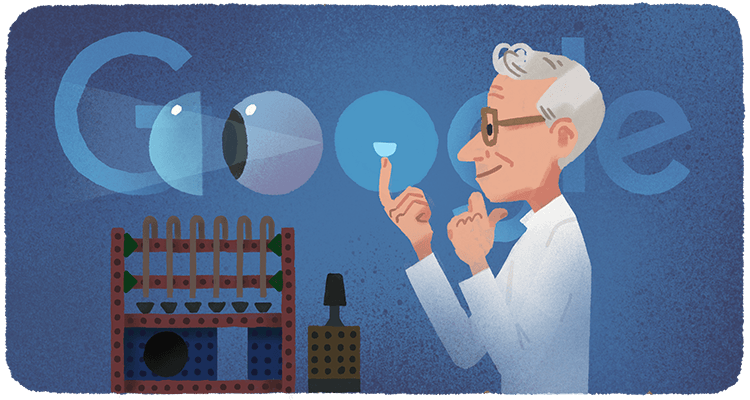Otto Wichterle: Czech chemist who invented soft contact lenses is recognised in Google Doodle
He was author to some 200 patents in organic chemistry, plastics and biomaterials

Your support helps us to tell the story
From reproductive rights to climate change to Big Tech, The Independent is on the ground when the story is developing. Whether it's investigating the financials of Elon Musk's pro-Trump PAC or producing our latest documentary, 'The A Word', which shines a light on the American women fighting for reproductive rights, we know how important it is to parse out the facts from the messaging.
At such a critical moment in US history, we need reporters on the ground. Your donation allows us to keep sending journalists to speak to both sides of the story.
The Independent is trusted by Americans across the entire political spectrum. And unlike many other quality news outlets, we choose not to lock Americans out of our reporting and analysis with paywalls. We believe quality journalism should be available to everyone, paid for by those who can afford it.
Your support makes all the difference.On his 108th birthday, Google’s Wednesday doodle honoured the life and legacy of Otto Wichterle, a Czech chemist who invented the soft contact lens.
Holding the lens on the tip of his finger, the doodle shows glass-wearing Wichterle looking at his revolutionary invention – now being used by an estimated 140 million people across the world.
“Happy birthday, Otto Wichterle—thanks for helping the world see eye to eye!” said Google on Wednesday, to give some fresh insights into his life and recognise his work in the field of science.
He was born in 1913 Prostejov, in what later became Czechoslovakia, and grew up with a passion for science from a very young age to later make several state-of-the-art inventions.
Wichterle, son of a producer of agricultural machinery, Wichterle earned his doctorate in organic chemistry in 1936 from the Prague Institute of Chemical Technology (ICT).
But when it was closed due to political turmoil under German rule in 1939, he spent some time in the Bata shoe manufacturing business. There he invented a nylon fibre which is frequently employed for industrial uses.
He was briefly imprisoned by the German Gestapo from 1942 until 1943.
After the Communist take-over of Czechoslovakia in 1948, he went on to become a professor of macromolecular chemistry at his alma mater in Prague and continued his work developing an absorbent and transparent gel for eye implants.
After about 10 years of research work into it, he started to manufacture hydrophilic soft contact lenses. He continued refining his hydrogel development at home and produced the first soft contact lenses with a DIY apparatus made of a child’s erector set, a bicycle light battery, a phonograph motor, and homemade glass tubing and moulds.
He was the author of some 200 patents in organic chemistry, plastics and biomaterials and a lifelong researcher. During his lifetime, he received an incredible number of awards and honours.
He also laid the foundation for the technologies such as “smart” biomaterials, which are found in pacemakers, heart valves, orthopaedic devices, and bio-recognisable polymers, which have inspired a new standard for drug administration.
Join our commenting forum
Join thought-provoking conversations, follow other Independent readers and see their replies
Comments